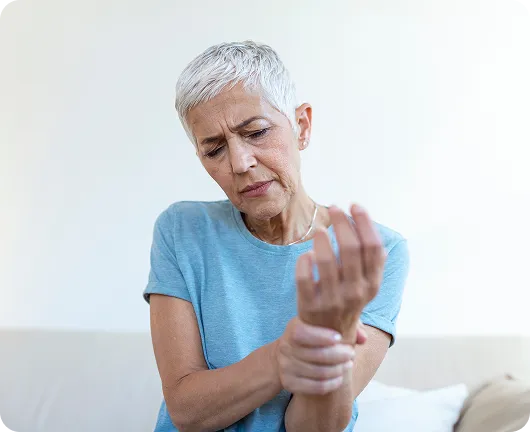Peripheral Neuropathy
Minimally invasive care to ease nerve pain and improve mobility without opioids

Understanding Peripheral Neuropathy and Its Impact
Peripheral neuropathy affects the peripheral nerves, which extend from the brain and spinal cord to the rest of the body. These nerves are essential for movement, sensation, balance, and coordination. When damaged, they can disrupt signal transmission, leading to pain, weakness, and other symptoms most commonly in the legs and feet.
This condition is often linked to autoimmune diseases such as diabetes, as well as infections and physical trauma. If left untreated, peripheral neuropathy can significantly interfere with daily life, causing sleep disturbances, sensory changes, and psychological stress due to chronic pain.
Understanding Peripheral Neuropathy and Its Impact
Peripheral neuropathy affects the peripheral nerves, which extend from the brain and spinal cord to the rest of the body. These nerves are essential for movement, sensation, balance, and coordination. When damaged, they can disrupt signal transmission, leading to pain, weakness, and other symptoms most commonly in the legs and feet.
This condition is often linked to autoimmune diseases such as diabetes, as well as infections and physical trauma. If left untreated, peripheral neuropathy can significantly interfere with daily life, causing sleep disturbances, sensory changes, and psychological stress due to chronic pain.

Causes of Peripheral Neuropathy
Peripheral neuropathy can result from a variety of causes, including:
Diabetes: Elevated blood sugar can damage peripheral nerves.
Nerve compression: Conditions such as herniated discs or spinal stenosis may compress nerves.
Physical trauma: Injuries to the spine or limbs can damage nerve pathways.
Infections: Viral or bacterial infections such as herpes or Lyme disease may affect peripheral nerves directly.
Symptoms of Peripheral Neuropathy
If you notice any of the following symptoms, consult your doctor for an evaluation:
✔ Pain, cramping, or discomfort in the legs—especially during activity
✔ Numbness, tingling, or weakness in the feet or legs
✔ Coldness or skin color changes in affected limbs
✔ Non-healing wounds or ulcers on the feet or legs
✔ Weak or slow pulse in the lower limbs
Diagnosis of Peripheral Neuropathy
If you have one or more of the previously mentioned symptoms and would like a professional diagnosis of peripheral neuropathy, your doctor will likely perform the following evaluations:
A review of your family medical history to identify hereditary factors
A physical examination focusing on your limbs, spine, and neck
Blood tests to detect underlying conditions
Additional evaluations as needed to assess nerve function
Treatment Options for Peripheral Neuropathy
As peripheral neuropathy can derive from multiple causes and correlated conditions, the best treatment option will depend on its root cause. Your doctor will help you choose the most appropriate treatment for you. These may range from the following disciplines:
Minimally Invasive Intervention
These procedures relieve nerve pressure with minimal tissue disruption, reducing recovery time and complication risk. For example, Minimally Invasive Lumbar Decompression (MILD®) is used to remove small portions of bone or tissue, easing pressure on the spinal and peripheral nerves.
Non-Opioid Medications
To avoid addiction and side effects, non-opioid medications are preferred. Options include:
✔ Nonsteroidal anti-inflammatory drugs (NSAIDs)
✔ Topical pain relievers
✔ Anticonvulsants
✔ Antidepressants
✔ Vitamin supplements
Neuromodulation
These treatments stimulate nerves to alter pain signals before they reach the brain. Options include:
✔ Peripheral nerve stimulation: Electrical impulses target specific nerves
✔ Nerve blocks: Temporarily numb affected nerve pathways
✔ Spinal cord stimulation: Alters spinal nerve activity using electrical pulses
✔ TENS (Transcutaneous Electrical Nerve Stimulation): Uses low-level impulses to reduce pain and improve circulation
Therapies & Lifestyle Changes
Conservative approaches can greatly improve outcomes. Your care plan may involve:
✔ Physical therapy to improve coordination and strength
✔ Relaxation techniques to manage pain perception
✔ Blood sugar management for diabetic patients
✔ Wearing supportive, comfortable shoes
✔ Following a balanced diet and exercising regularly
✔ Avoiding excessive alcohol and smoking

Care That’s Close to Home
We offer care from two convenient clinic locations, making it easy to access expert medical support close to home.
Each facility is designed to provide a welcoming, safe, and efficient environment equipped with advanced technology and supported by a compassionate team dedicated to your well being.
Care That’s Close to Home
We offer care from two convenient clinic locations, making it easy to access expert medical support close to home.
Each facility is designed to provide a welcoming, safe, and efficient environment equipped with advanced technology and supported by a compassionate team dedicated to your well being.

Why Choose Spinal Diagnostics?
Patients choose Spinal Diagnostics for our comprehensive approach, accurate diagnostics, and compassionate care. We stay at the forefront of interventional procedures and are committed to improving your quality of life without opioids or invasive surgeries.
Proven Medical Expertise
We bring years of clinical experience in pain management and interventional procedures.
Constant Innovation
We use the latest techniques and technology to ensure safe, effective treatment.
Compassionate Care
We listen, understand, and treat every patient with empathy and respect.
Personalized Plans
Each treatment is tailored to your condition, goals, and lifestyle.
Explore the treatments that bring real relief.
Learn how our non-invasive solutions and personalized plans can help you feel better, faster.
Explore the treatments that bring real relief.
Learn how our non-invasive solutions and personalized plans can help you feel better, faster.


